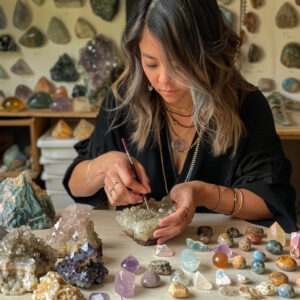Quick summary
- A streak plate is a piece of unglazed porcelain that has a hardness of 7 on the Mohs scale.
- A harder mineral will be able to scratch a softer mineral with less force than a softer mineral will be able to scratch a harder mineral.
Apatite and calcite are two common minerals found in the Earth’s crust. Apatite is a phosphate mineral, while calcite is a carbonate mineral. Both minerals have a wide range of colors and can be found in various geological settings.
One of the most important properties of a mineral is its hardness. Hardness is measured on the Mohs scale, which ranges from 1 to 10. The higher the number, the harder the mineral. Apatite has a hardness of 5 on the Mohs scale, while calcite has a hardness of 3. This means that apatite can scratch calcite.
The Mohs Scale of Hardness
The Mohs scale of hardness is a relative scale that measures the resistance of a mineral to scratching. The scale was developed by the German mineralogist Friedrich Mohs in 1822. The scale consists of ten minerals, each with a hardness value ranging from 1 to 10. The minerals are:
- Talc (hardness 1)
- Gypsum (hardness 2)
- Calcite (hardness 3)
- Fluorite (hardness 4)
- Apatite (hardness 5)
- Orthoclase feldspar (hardness 6)
- Quartz (hardness 7)
- Topaz (hardness 8)
- Corundum (hardness 9)
- Diamond (hardness 10)
How to Test the Hardness of a Mineral
The hardness of a mineral can be tested using a variety of methods. One common method is to use a streak plate. A streak plate is a piece of unglazed porcelain that has a hardness of 7 on the Mohs scale. To test the hardness of a mineral, simply rub the mineral across the streak plate. If the mineral leaves a mark on the streak plate, then it is softer than the streak plate. If the mineral does not leave a mark, then it is harder than the streak plate.
Other Factors that Affect Scratching
In addition to hardness, there are a number of other factors that can affect whether or not one mineral can scratch another. These factors include:
- The shape of the mineral. A sharp point can scratch a softer mineral more easily than a blunt point.
- The angle of the scratch. A scratch made at a shallow angle is more likely to be successful than a scratch made at a steep angle.
- The force of the scratch. A harder mineral will be able to scratch a softer mineral with less force than a softer mineral will be able to scratch a harder mineral.
Applications of Apatite and Calcite
Apatite and calcite are both used in a variety of applications. Apatite is used in the production of fertilizers, ceramics, and glass. Calcite is used in the production of cement, lime, and paper.
Takeaways: The Hardness of Minerals
The hardness of a mineral is an important property that can be used to identify minerals and to predict their behavior in different situations. The Mohs scale of hardness is a useful tool for measuring the hardness of minerals.
Questions You May Have
- Q: Can apatite scratch calcite?
- A: Yes, apatite can scratch calcite because apatite has a higher hardness than calcite on the Mohs scale.
- Q: What is the Mohs scale of hardness?
- A: The Mohs scale of hardness is a relative scale that measures the resistance of a mineral to scratching. It ranges from 1 to 10, with 1 being the softest and 10 being the hardest.
- Q: How can I test the hardness of a mineral?
- A: You can test the hardness of a mineral using a streak plate. A streak plate is a piece of unglazed porcelain that has a hardness of 7 on the Mohs scale. To test the hardness of a mineral, simply rub the mineral across the streak plate. If the mineral leaves a mark on the streak plate, then it is softer than the streak plate. If the mineral does not leave a mark, then it is harder than the streak plate.
